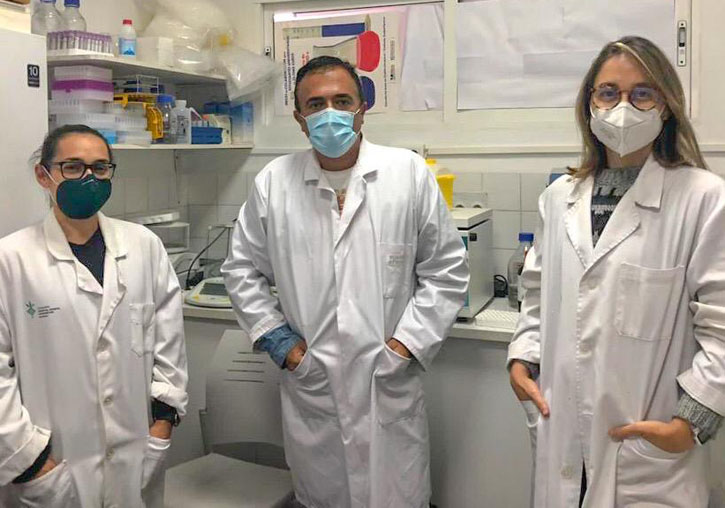A study proves the connection between inflammatory markers and the increase of frailty in prostate cancer patients
- Press Office
- November 9th, 2020

Experts from the Universitat de València and the Valencian Institute of Oncology (IVO) have proved how some inflammatory markers measured in the blood are related to the progression of the frailty syndrome in prostate cancer patients, the most common tumour in men.
Professor Omar Cauli, from the Faculty of Nursing and Podiatry of the Universitat de València, is in charge of the team 'Fragilidad y Deterioro Cognitivo' ('Frailty and Cognitive Impairment'), in which participate professors Cristina Buigues, Rut Navarro, Vanessa Sánchez and Julio Fernández. On behalf of the Urology Service of the IVO, José Rubio Briones (head of service), the nurse María Serrano and the urologist Augusto Wong take part in the team.
Prostate cancer is the third leading cause of cancer death among men. In most cases, it is a hormone-dependent cancer because it depends on the androgenic hormones (testosterone is the most important one) for its development. Hormones act as intercellular messengers by modifying the behaviour, metabolism and growth on many cells both carcinogenic and normal ones.
The top-of-the-line treatment in many men with prostate cancer consists in an androgen deprivation therapy (ADT) that is able to promote or contribute to the frailty syndrome. This geriatric syndrome makes reference to a clinical-biological state characterised by a decrease in the resistance and the adult's physiological reserves in stressful situations as a result of the accumulative exhaustion of the physiological systems, which causes a greater risk of suffering from adverse health effects.
Thus, at a clinical level, frailty assessment and treatment are crucial on elderly people. It can also have an effect on cancer patients and contribute to frailty syndrome and its adverse health effects such as an increase in the risk of falling, cognitive and behavioural impairments, and an increase in cardiovascular risks, among others. This syndrome is related to disability, dependence, long-term care needs and premature mortality.
Studies have assessed whether the ADT can contribute to the progression of frailty during the monitoring of patients that have been undergoing this treatment for a year, and whether blood inflammatory markers could be related to frailty and its progression over time.
The frailty syndrome closely overlaps with the known toxicities of ADT treatment as well as with the decrease in age-associated testosterone levels. It could therefore lead to the appearance of frailty in non-weak people, or accelerate the progression of frailty in people with an already established level of it. Among the frailty's pathophysiological bases, the presence of low-grade chronic inflammation is said to be related to its adverse results.
The results of the study showed that the blood concentration of the inflammatory marker IL-6 concentration in blood and the count of lymphocytes (a kind of cells of the immune system that fight against infections, among other functions) are possible useful biomarkers for identifying weak patients and predict progression of frailty in prostate cancer patients under ADT treatment. Thus, this study suggests that these biomarkers should be used to guide clinical decisions about prostate cancer treatment based on a multidisciplinary approach including different health professionals.
The results of the study have been published in two renowned international journals in the field of Oncology and Urology.
--------------------------
Navarro-Martínez R, Serrano-Carrascosa M, Buigues C, Fernández-Garrido J, Sánchez-Martínez V, Castelló-Domenech AB, García-Villodre L, Wong-Gutiérrez A, Rubio-Briones J, Cauli O. Frailty syndrome is associated with changes in peripheral inflammatory markers in prostate cancer patients undergoing androgen deprivation therapy. Urol Oncol. 2019 Dec;37(12):976-987.
Buigues C, Navarro-Martínez R, Sánchez-Martínez V, Serrano-Carrascosa M, Rubio-Briones J, Cauli O. Interleukin-6 and Lymphocyte Count Associated and Predicted the Progression of Frailty Syndrome in Prostate Cancer Patients Undergoing Antiandrogen Therapy. Cancers (Basel). 2020 Jun 29;12(7):1716.
File in: Facultat de Farmàcia , Investigació a la UV
















